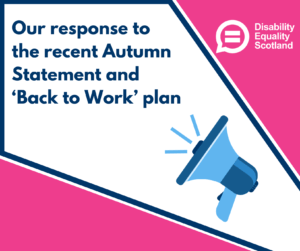‘Duty’ to Work? Our Response to the Recent Autumn Statement and ‘Back to Work’ Plan

Disability Equality Scotland finds the proposed changes to give the Department of Work & Pensions the power to strip people of their social security as immoral, unworkable, and plainly wrong. Disabled people, not Government ministers, have a unique insight into their own lives and capabilities. They are able to contribute to society in a manner that meets these. Along with their own medical professionals’ input, they are best placed to say whether they are fit for work.
Disabled people face daily societal barriers in life as well as specific barriers to entering good quality, appropriate work. We still find that employers are not yet doing enough to change their employment practices to make work more accessible. Disabled people contribute to our society in many different forms, not just those shaped as traditional jobs/work. Their underlying desire is all people to be part of a wider society. For those where working in the traditional sense not an option, forcing people to do their ‘duty’ and return to work will result in more people entering poverty, increased mental health illness and a huge impact on their physical health and, unfortunately, lead to more suicides.
Our UK government indicated that they are a compassionate government. However, disabled people across Scotland (and wider UK) are faced with struggling for the essentials they need for survival. Households with one disabled adult or child are more likely to be in poverty than those without. Research by the Joseph Rowntree Foundation has found that almost two-thirds of people experiencing destitution in the UK were disabled or had long-term health conditions.
Our social security system was built out of justice and compassion. We wanted to put an end to the days where people who were unable to work were left on their own to fall into poverty, isolation, and destitution. Yet we are still living in an unjust economy, where low wages and insecure hours means paid work doesn’t cover the living costs for too many people.
We do welcome however, the Chancellor’s decision that Universal Credit and other benefits will be uprated in line with the September CPI and the commitment to increase the state pension is in line with the triple lock. However, this is not enough.
We need to see a focus on creation of jobs that are suitable for disabled people, with decent pay and conditions and appropriate support. This support must be seen as an opportunity and with fairness, dignity, and respect at all times. It must not be a threat, as has currently been presented.
Substantial evidence was submitted to the Work Capability Assessment consultation in October 2023, demonstrating that jobs that can be carried out wholly or mostly from home remain a relatively small proportion of vacancies. These are unlikely to be the types of jobs available to those who may be returning to the job market after a number of years. Employers are already rolling back on flexibility in the aftermath of the pandemic.
We hope MPs will do the right thing and ensure that nobody is deprived of their basic human rights – access to social security and being able to live an independent life. This is their duty as elected officials of a modern society.
Lyn Pornaro
Chief Executive Officer
